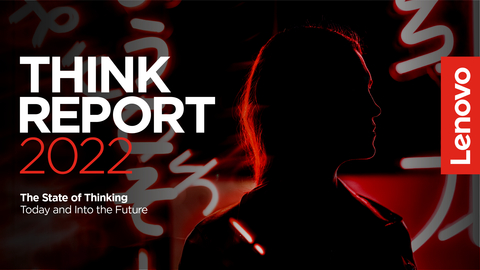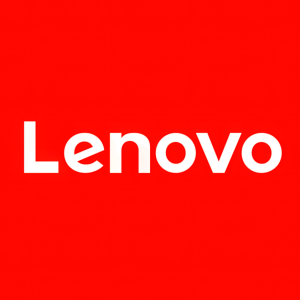Lenovo Think Report Reveals Barriers to Critical Thinking and How Technology Can Empower Progress for a Better World
In honor of ThinkPad’s 30th anniversary, Lenovo conducts an in-depth global research study to understand thinking habits, identify thinking gaps and uncover new ways of thinking through technology that can better the future of humanity
RESEARCH

Lenovo Think Report 2022: The State of Thinking Today and Into the Future (Photo: Business Wire)
This timely report – which surveyed 5,700+ people across the US,
“It is eye-opening to see that people globally feel that societal progress is in jeopardy because of a lack of real thinking.
The Thinking Gap
Respondents largely feel that the external events of the last few years (e.g., COVID-19, economic disruptions, etc.) are contributing to and exacerbating distractions, heightened multitasking and fatigue, which further impairs the quality of their thinking.
-
Across all respondents, just
34% say they spend "all" or "most" of their thinking time in clear, deep, and productive thinking. -
75% of IT Decision Makers globally say that their colleagues struggle “a great deal” or “somewhat” with engaging in clear and productive thinking. -
64% of those surveyed feel that they are reliant on practical or “survival” thinking and the ability to think quickly and multitask is “extremely” or “very important” – thus, resulting in a lack of innovative and actionable thinking that can impact advancements.
In tandem, most respondents feel the situation is not improving – projecting that their lives will not get any easier or any less stressful over the next several years.
The Power of Thinking
Across the globe, while broad segments of respondents said they are struggling to achieve better thinking today, respondents have positive associations with improved thinking and understand the benefits that come with unlocking higher-order thinking.
-
65% of respondents believe that engaging in clear, deep, productive thinking will help them make better decisions. -
79% of those surveyed in theU.S. consider critical thinking “extreme” or “very important.”
Thinking Habits
While people recognize the power of improved thinking, productive thinking times vary greatly depending on the region, and don’t always align with the traditional “9-to-5” workday.
-
37% of Americans surveyed and24% of respondents in theUK prefer late nights or early mornings. -
25% of Japanese respondents favor mid-morning. On the other hand,35% of Germans think more clearly in the evenings.
Across the board, those surveyed believe the #1 must-have for better thinking is a quiet environment – and respondents in the US,
Better Thinking Empowered by Technology
Based on the research, evolutions in communication and collaboration technologies are considered as the most helpful features in promoting better thinking. In addition, learning how to use technology more purposefully – including setting some boundaries, limiting distractions and decreasing clutter of information – can help us build better thinking habits.
-
66% of Business End Users surveyed are looking for information on how technology can help with clear, deep and productive thinking. They are also more willing than the general population to consider re-evaluating their relationship with technology. For example, many feel that simplifying tasks could help individuals achieve better thinking. -
40% of respondents inGermany would learn how to use technology more purposefully. -
39% of respondents in theU.S. would set boundaries around their technology usage. For example, setting time aside to play an instrument or exercise.
Overwhelmingly, IT Decision Makers surveyed feel optimistic about the technology their coworkers have access to and how it enables clear thinking for employees and organizations. Whether it’s crunch time to meet deadlines, a need for business minds to come together, or the opportunity to invent – more than
Thinking for Humanity
Overall, respondents believe that improved thinking has the potential to leave long-lasting impacts. A majority of those surveyed agree that better thinking would increase our collective humanity and we would be closer to solving challenges facing humanity and society for future generations to come.
-
62% in the US,54% in theUK and52% inGermany say that our society would be kinder if we engaged in more clear, deep and productive thinking.
The full Think Report can be viewed here.
Methodological Note
Fieldwork for this study was conducted via an online survey of 5,768 respondents from
About Lenovo
Lenovo (HKSE: 992) (ADR: LNVGY) is a
1 Gen Z / Millennials who use technology in their profession
2 IT Decision Makers
View source version on businesswire.com: https://www.businesswire.com/news/home/20221005005300/en/
ksilverstein@lenovo.com
Source: Lenovo







